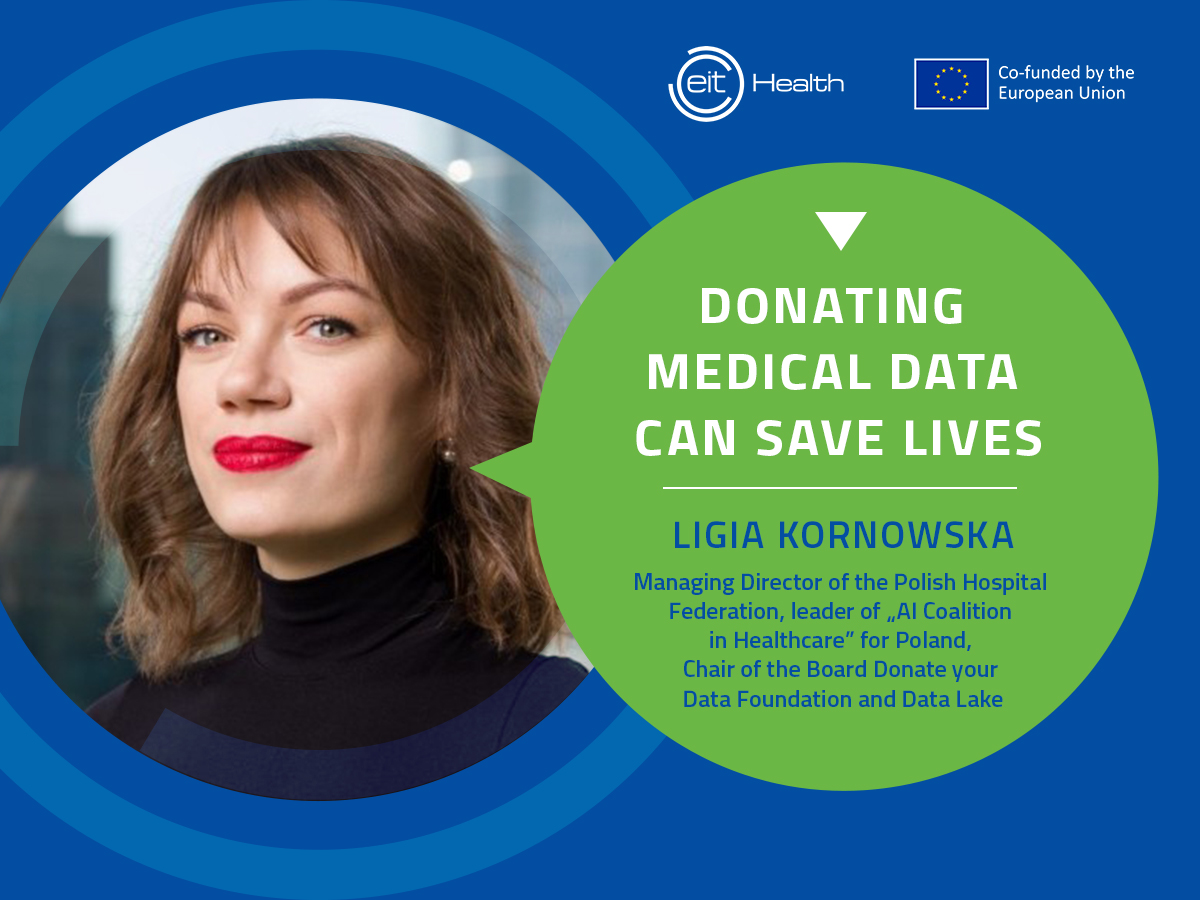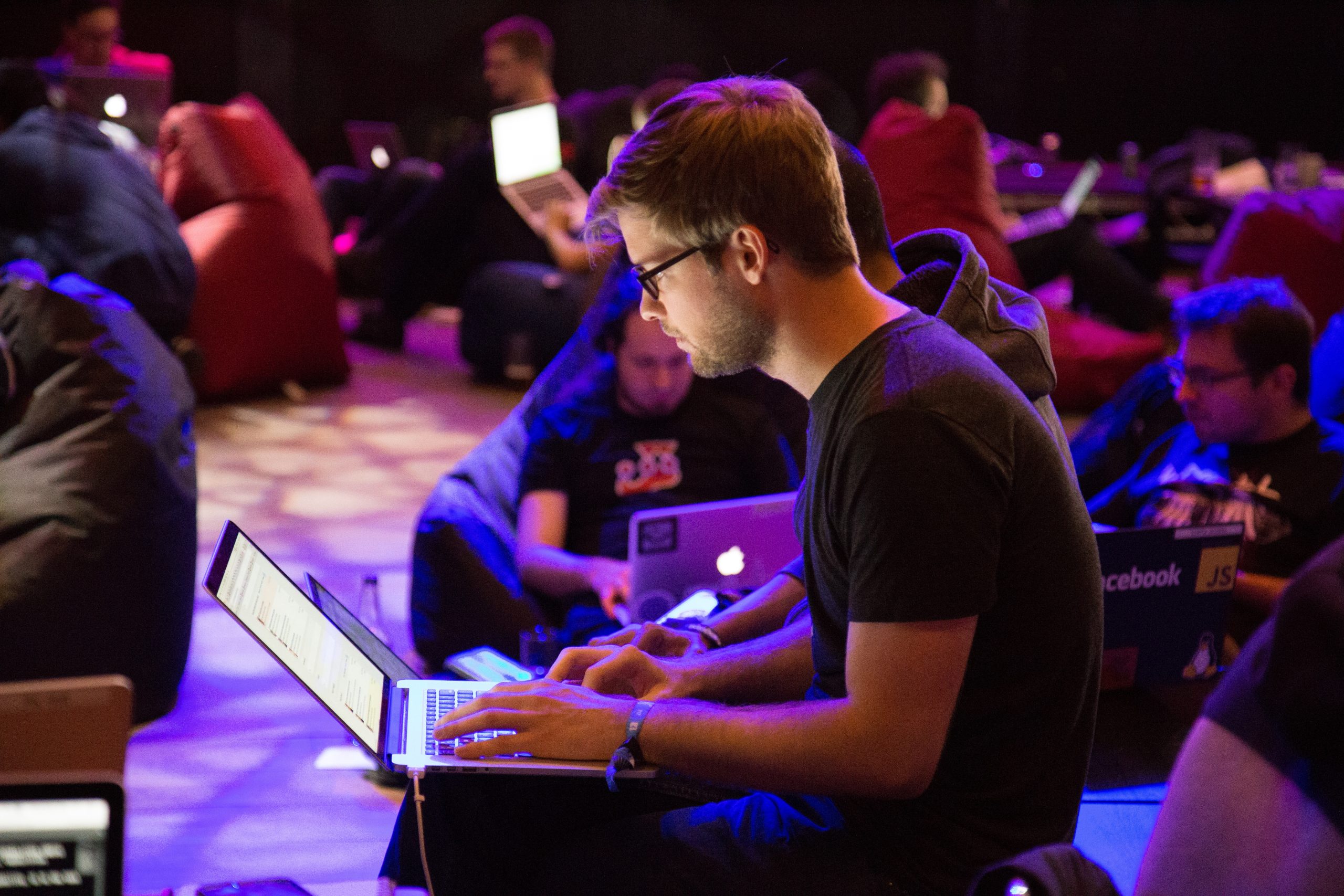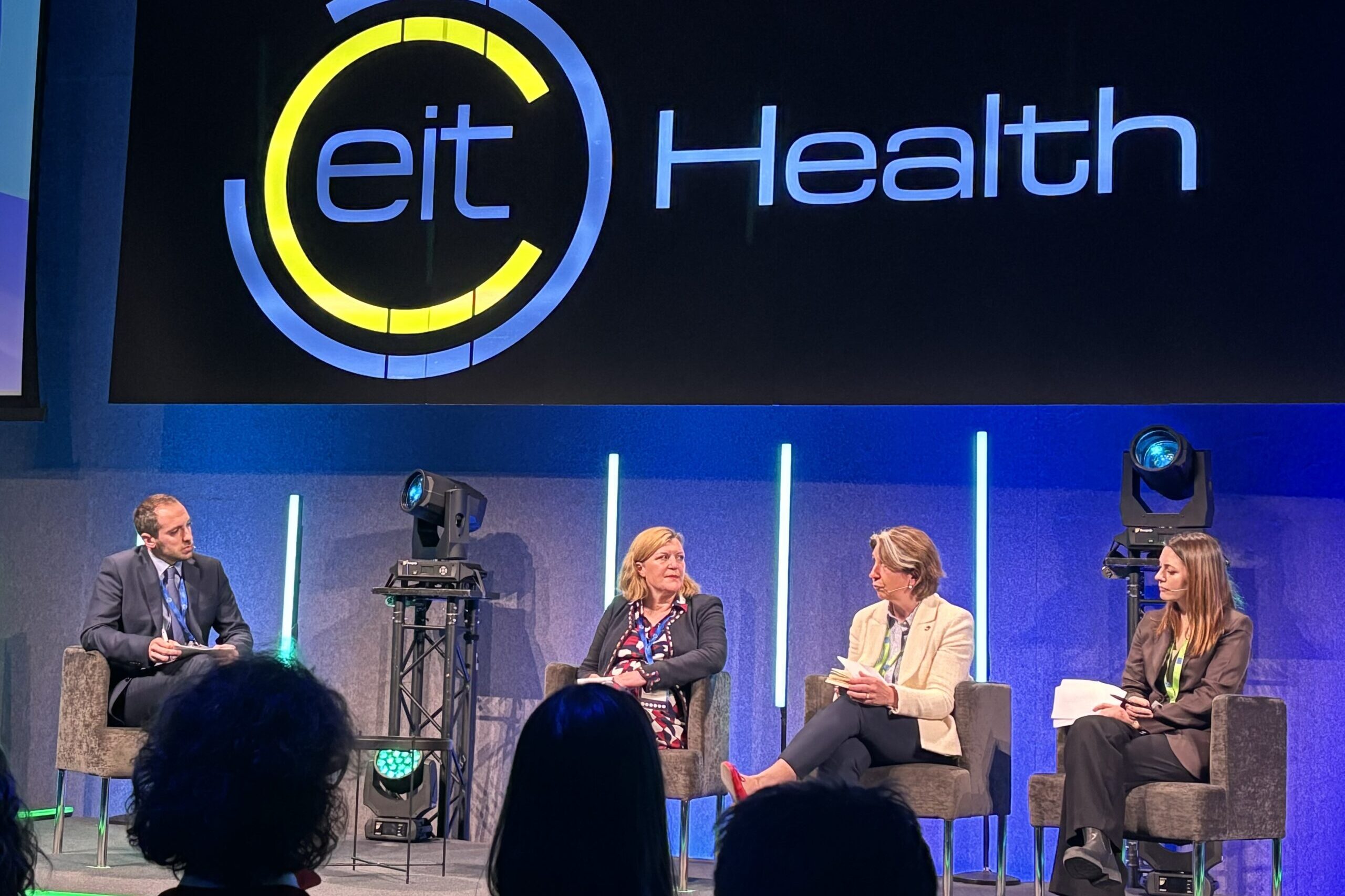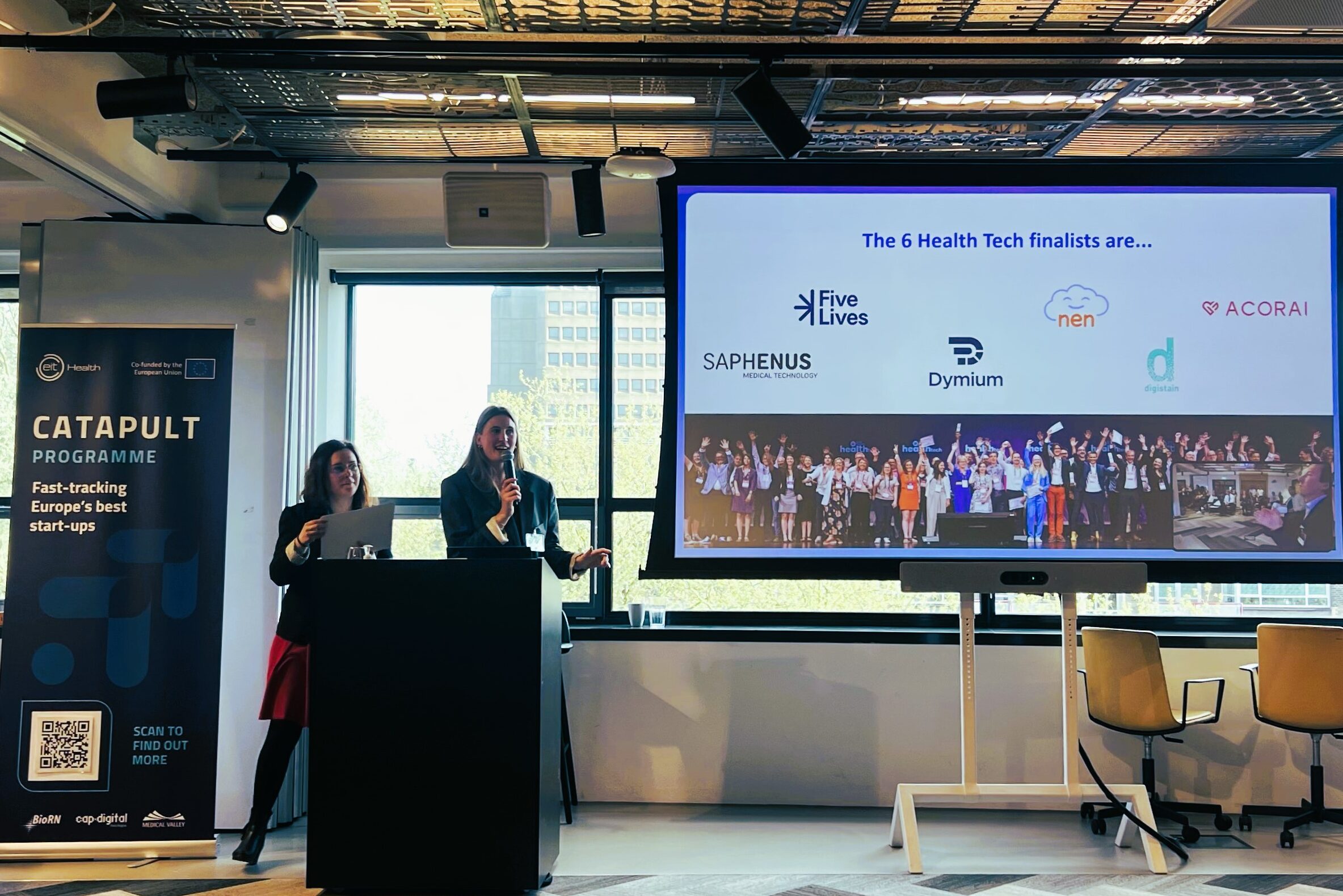9th November 2022
EIT Health supports the Data Donation project in Poland, with the potential to be scaled out. Medical doctor Ligia Kornowska explains why sourcing medical data from various geographical areas and demographic groups is needed to save patients’ lives.

Progress in modern medicine is based on researchers having access to good data, whether we are talking about treatment, cures, or even understanding the diseases themselves. However, unlike countries like China and the US, most EU countries don’t have a system to collect medical data. That’s why Ligia Kornowska, a Polish medical doctor started the Data Lake Medical Data Donation System with the assistance of EIT Health.
How would you define data donation? How is it different from previous approaches?
Data donation is the altruistic act of contributing your medical history to science, much like donating blood or organs. Donating your medical data can help save the lives of others by providing vital information to researchers studying diseases, discovering new cures, and creating new treatments and medications. Medical data donation has been attempted before; however, it is still easier to donate your body to science than your medical records. The solution we propose is built on the latest technologies needed to ensure the right mix of transparency and privacy. Moreover, our system incentivises different stakeholders, including data donors (or “data heroes” as we call them) and the hospitals. We believe it can increase medical data donation and, as a result, improve individual and public health.
What was the primary motivation for starting this project?
Progress in modern medicine is based on scientists having access to quality data, including behavioural data, genomic and molecular data, and biophysical data. It is critical for offering “personalised” diagnosis, treatment or prevention, or even understanding of the diseases themselves. The issue is that much of this data is inaccessible and fragmented, and many studies remain unfinished or impossible to start. There are 400 million people worldwide suffering from rare diseases. There are 7,000 types of these diseases, and only 5% of them have medical therapy which is approved. This makes 380 million people left without any form of treatment or hope! With an international medical data donation programme like ours, therapy for those patients can soon become possible. This is our primary purpose.
Why is access to data needed so much to find these solutions?
Researchers’ access to medical data is a question of life or death for many people. Additionally, as more artificial intelligence (AI) algorithms and machine learning tools come online, the need for high-quality and representative data becomes even more significant. These technologies are already proving to be incredibly useful in early detection and diagnosis, as well as in fields like pharmacology and the creation of novel medications. There is, however, a massive problem for these emergent technologies, primarily because under-representation in medical data creates a considerable bias regarding the results. Medical data donation is greatly needed, but perhaps even more critical is sourcing medical data from as many geographical areas and demographic groups as possible to ensure better representation in medical studies for people of all ethnicities, races, and genders.
What is your overview of the situation of data donation in the EU? Do you see any best practices we can learn from?
Generally speaking, there is little to no data donation in Europe. However, important legislative works are in progress, and regulatory frameworks are under development. I’m glad that legislation packages like the General Data Protection Regulation (GDPR) and Data Governance Act (DGA) are in place, and more is yet to come (European Health Data Space – EHDS). It is a stepping stone to creating a comprehensive legal framework for ethical data usage for vital research purposes.
Countries generally fall into three categories when it comes to data donation. The first is mandatory donation without consent or privacy; this is how “data donation” is done in China. This approach gives access to enormous amounts of centralised health data but does not consider individual rights like privacy and data ownership. Other countries, such as the USA, have privacy protections but no consent-based donation system. Medical data is bought and sold by private companies, just like any other data. The last group is countries with no efforts to leverage medical data, whether through donations or mandatory participation programmes. Many European countries fall into this last category. The legislation I mentioned – GDPR, DGA and the EHDS proposal – could encourage European countries to allow data donation. Our data donation scheme is strongly based on the Data Governance Act, making it one of Europe’s first projects in line with DGA. Like it is happening with blood, these donations will be safe for the “donors” and bring much public good. By the latter, I mean both progress in medical sciences to save human lives and, at the same time, a boost for innovation of the economy of Europe.
How do you address data privacy concerns?
We believe that privacy and data ownership are fundamental rights. Among the founders of this project, we have three medical doctors who share the meaningful purpose and the vision that medical data is often our most personal data. GDPR and DGA compliance is just the start regarding data privacy. We know that a medical data donation system has to be based on consent and the right to withdraw, have strong privacy protections and be technologically transparent to be trustworthy. Cybersecurity is one of our top priorities, which means stringent internal procedures related to data access, in-depth audits and penetration testing of all systems and code bases, and many other active methods of protecting people’s data and privacy. We use the latest encryption and anonymisation technologies to prevent fraud and the same identity verification methods used by financial and governmental institutions. When someone donates their data through us, we become the legal controller of their data and are responsible for protecting it. It’s a responsibility we take seriously, and that’s why we have a policy of going above and beyond legal requirements in safeguarding data.
What do you expect from the project in the short and long term?
In the short term, we have already started our first data donation campaign in a Warsaw hospital and collected our first consent! We are in talks with other healthcare facilities to expand our campaign in Poland. With proof of concept already taking place, we’re looking towards European expansion within the next year using a franchise model. In the longer term, we expect to branch out into North American markets to help ensure diversity and representation in the data we collect. We genuinely hope our programme will become a global movement to help power medical research to benefit all humanity.
How can EIT Health help and be plugged into this project on a broader scale?
EIT Health is one of the co-creators of Donate your Data Foundation[1] in Poland and was cooperating with us, helping to establish the whole project from the beginning. EIT Health is our partner of choice when it comes to the internationalisation of the project. We know this extensive network of Partners all-over Europe is the right “audience” for popularising data donation. We are also looking for ways to bring more awareness to our project and to help onboard new “data heroes”. Whether through social or traditional media, co-marketing and co-events, or simply through connections to the right people in the European digital health space, we would be extremely grateful for any help in this quest.
You are a medical doctor working in one of the hospitals and an acting director of the Polish Hospital Federation. How do you find time to develop such an ambitious project?
Nearly everyone in our team has either experienced illness or had a family member suffering from a disease. That’s why data donation speaks to all of us. As a representative of the Polish Hospital Federation, I can see how big a problem accessing medical data for R&D is. And I’m excited that Polish Hospital Federation is one of the co-creators of the whole project. As doctors, we’ve seen this first-hand, and we know what it feels like to tell a patient that there is no cure or effective treatment for their suffering. The personal experiences and stories we have are why each of us is personally driven to make this project a success. Even though it requires working overnight, I believe it is worth every effort.
[1] The aim of Donate your Data Foundation – enabling data donation to support the development of medicine and R&D in life sciences – is in line with the ambitions of EIT Health. Access to medical data that respects the privacy of the patients on one hand and on the other allows for using it by researchers and innovators is key for improving the delivery of healthcare and making the healthcare sector an engine of economic development in Europe.
Join the heartbeat of healthtech in Munich this June

Discover the third annual health.tech conference.
Health experts make recommendations on EHDS implementation

Discover our new Think Tank report.
